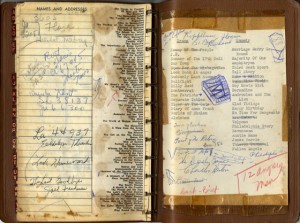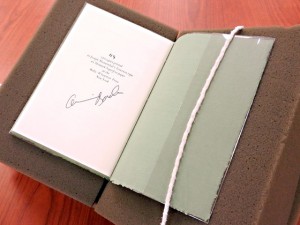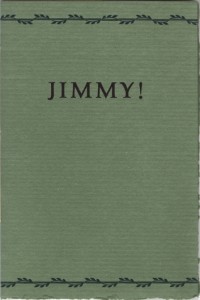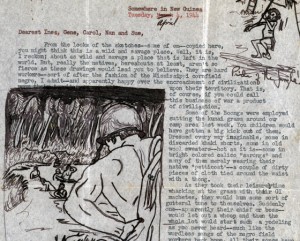
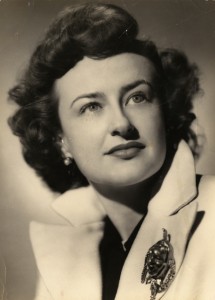
portrait of Nina Vance, from the Nina Vance Alley Theatre Papers
The campus is still abuzz over this week’s announcement regarding the Alley Theatre performing its 2014-2015 season at the University of Houston.
Beginning in July 2014, the Nina Vance Alley Theatre building will begin a $46.5 million renovation scheduled to last until the opening of the fall 2015 season. The renovation, planned to modernize and improve the infrastructure of the Alley, also sent the Alley looking for a temporary home.
Enter the Wortham Theatre and the Cynthia Woods Mitchell Center for the Arts.
The result provides what UH President Renu Khator has characterized as “an outstanding opportunity for our theatre students to directly engage with the Alley’s working professionals.”
Not only is the University of Houston providing a temporary home for this world-renowned theatre, but we are also proud to be home to a little of its history as well–the Nina Vance Alley Theatre Papers.
In 1947, after working in Houston as a high school teacher, Nina Vance began a campaign to establish a resident theatre in Houston. She set up shop in a former dance studio, tucked away in a little alley (hence the name) near Main Street. Shortly thereafter, the Alley would also call an old abandoned fan factory home before finally settling in at its current address at 615 Texas Avenue. Vance would continue to serve as an influential figure in theatre, serving on the advisory committee for the Kennedy Center for the Performing Arts, serving two terms on the U.S. Commission on International Education and Cultural Affairs, and playing the role of cultural ambassador during a 1977 State Department tour of Soviet Russian theatre. Nina Vance passed away early in 1980 and the building she willed into being was renamed in her honor.
The Nina Vance Alley Theatre Papers, available for study in the Special Collections Reading Room, provide a telling road map of the evolution of theatre in the city of Houston and a bold experiment that served to challenge Broadway and helped democratize stage theatre for other regions of the nation. Highlights from the collection include Vance’s personal papers, correspondence related to the Alley, along with calendars and diaries illustrating the day-to-day work of a pioneering figure.
As the Alley comes to call the UH campus home, we invite you to visit us here at the University of Houston Special Collections and spend some time catching up on the history of this iconic theatre and the woman who manifested that vision.
This week, the nation celebrates the life of noted civil rights activist Dr. Martin Luther King, Jr. Dr. King led non-violent protests 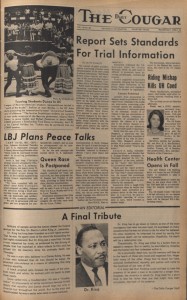 against segregation throughout the country, including the Montgomery Bus Boycott, the March on Washington, and the Selma to Montgomery Marches, among numerous others, over a span of fifteen years. These actions helped bring about the end of legal segregation with the passing of the 24th Amendment and the Civil Rights Act of 1964.
against segregation throughout the country, including the Montgomery Bus Boycott, the March on Washington, and the Selma to Montgomery Marches, among numerous others, over a span of fifteen years. These actions helped bring about the end of legal segregation with the passing of the 24th Amendment and the Civil Rights Act of 1964.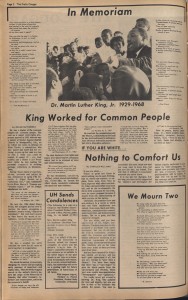
On the evening April 4th, 1968, the world was shocked by the assassination of Dr. King in Memphis, Tennessee. The April 10th Daily Cougar captured the thoughts and feelings of students—both black and white—on the University of Houston’s campus, which had been integrated quietly in the fall of 1961. Materials related to the integration of UH can be found in the President’s Office Records while Cougars of Any Color discusses the integration of the UH Athletics Department. Additionally, the Thomas R. Cole Desegregation Papers are a rich resource on the Civil Rights Movement in Houston.
The University continues to celebrate Dr. King’s legacy with a MLK Day Celebration and a UH Day of Service.
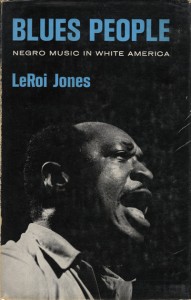
Cover of Blues People by LeRoi Jones (Amiri Baraka)
Poet, playwright, and the generally prolific and polarizing Amiri Baraka passed away in his hometown of Newark, NJ on January 9th, 2014.
Standing at the early vanguard of the Beat Generation, Amiri Baraka (then LeRoi Jones) settled in Greenwich Village in the 1950s, striking up early dialogues with Beat luminaries like Allen Ginsberg. In the early 1960s he published Blues People: Negro Music in White America and won an Obie Award for his controversial play, Dutchman. Issues of race and divergent political leanings often found themselves boiling to the top of his writings, but it was the 1965 assassination of Black Nationalist Malcolm X that served as the crucible of radicalization for the Amiri Baraka that would emerge from the violence of the 1960s. Literally and symbolically leaving The Village for Harlem, and as more and more progressive leaders like Martin Luther King, Jr. and Robert Kennedy found themselves felled by assassins’ bullets, a poetry of radical self-defense began to ring out from Baraka and the hundred blocks.
But, for Baraka, this was not a method and manner of simply courting controversy. It was a necessity to his writing. In a 1986 interview with Terri Gross, discussing the hard edges of race and violence that have defined himself and his family, themes that thereby push themselves to the forefront of his writings, Baraka states, “To talk about those things in America is to be radical. Just to talk about them.”
Baraka’s greatest controversy may have come in the wake of the 9/11 terrorist attacks, while he was Poet Laureate of New Jersey and penned “Somebody Blew Up America.” Lines dripping with anti-imperialist rhetoric, that even elicited accusations of anti-Semitism, did not sit well with New Jersey Governor James McGreevey. Failed attempts to remove Baraka from the post of Poet Laureate finally resulted in the state’s legislature abolishing the position outright, only four years after establishing it, rather than allow Baraka to retain the title.
Here at the University of Houston Special Collections we celebrate the writing and life of Baraka with a handful of items representing his literary legacy. Of particular note is a copy of his breakthrough Blues People as well as a signed copy of “Jimmy,” the eulogy Baraka gave at the funeral of James Baldwin (#119 of 150 copies printed to mark the occasion) back in 1987.
Baraka’s funeral will be held in his hometown of Newark on January 18th. He was 79 years old.

Librarians at the New York Times Information Bank terminal in the M.D. Anderson Library, courtesy of the Digital Library’s Image Café
Just to provide a little echo in these chambers, and for those who may not have caught wind of it elsewhere, a gentle reminder to all that planned server maintenance on Sunday morning, January 12th, will leave our typically online services off of the line. This may preclude your customary Sunday morning perusal of archival finding aids.
Researchers and scholars, please don’t wait until Sunday morning to get your weekend fill of research.
A happy weekend to all, particularly those hard at work on our servers. A new semester awaits!
More good news from the good people over at our Digital Library! The digital collection of Captain O.C. McDavid’s World War II correspondence is now live and online.
An old-school Mississippi journalist, O.C. McDavid was born in Ruth, Mississippi in 1911 and started honing his newspaper chops in high school, sweeping the floor of a local print shop. As he pursued his journalism career, the outbreak of World War II brought about a fateful detour. Stationed in the Gilbert Islands, his letters home from the South Pacific resound with the wonder and insight of a professional writer.
A visual artist as well (McDavid would go on to become a prolific sculptor later in life), his letters home were often punctuated with sketches and drawings from half a world away. While the original materials have remained available for study in the Special Collections Reading Room, the work of the Digital Library allows patrons to remotely access and enjoy this distinct narrative of World War II.
You can find more information on O.C. McDavid and his writings online or in person.
